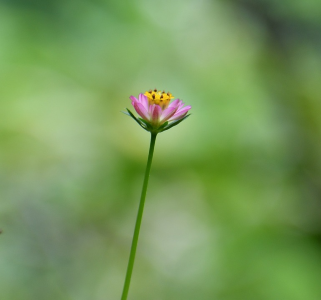The effect of ethanol extract of Cosmos caudatus leaves on the percentage of the cell cycle in Candida albicans culture

Accepted: 2 October 2023
HTML: 17
All claims expressed in this article are solely those of the authors and do not necessarily represent those of their affiliated organizations, or those of the publisher, the editors and the reviewers. Any product that may be evaluated in this article or claim that may be made by its manufacturer is not guaranteed or endorsed by the publisher.
Authors
Candidiasis is a common fungal gynecological disease among humans. The use of antifungal agents, such as Fluconazole, has been reported to increase resistance to candidiasis by 7%. This study aimed to investigate the effect of antifungal flavonoids from Cosmos caudatus leaf extract on the cell cycle percentage in C. albicans culture. This research employed a true experimental post-test only with a control group design. The C. albicans isolate was obtained from the Microbiology Laboratory under the code C. albicans SV-1148. The isolates were cultured in Sabouraud Dextrose Agar (SDA) medium and Sabouraud Dextrose Broth (SDB). The sample group was divided into a negative control group, a positive control group with fluconazole (60 µg/ml), and a treatment group with various concentrations of ethanol extract from Kenikir leaves (C. caudatus Kunth.) - 5%, 10%, 20%, 40%, and combinations (20% ethanol extract from Kenikirleaves + 30 µg/ml Fluconazole). This study revealed a reduction in the percentage of cell cycles in the S phase (DNA synthesis) in the treatment group receiving ethanol extract from Kenikir leaves (C. caudatus Kunth.) and the combination treatment group compared to the negative control group. The study suggests that this decrease in the percentage of cell cycles results from DNA damage caused by the presence of flavonoids in Kenikir leaves (C. caudatus Kunth.). Kenikirleaves (C. caudatus Kunth.) have the potential to decrease the percentage of S-phase cell cycles (DNA synthesis) in the culture of C. albicans. This research demonstrates that Kenikir leaves (C. caudatus Kunth.) contain natural flavonoids with antifungal properties and have the potential to be used as an alternative medicine for candidiasis in humans. It is hoped that incorporating Kenikir as a food ingredient can serve as an alternative prevention and treatment approach for candidiasis.
How to Cite

This work is licensed under a Creative Commons Attribution-NonCommercial 4.0 International License.

 https://doi.org/10.4081/hls.2023.11754
https://doi.org/10.4081/hls.2023.11754



